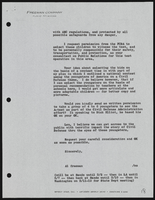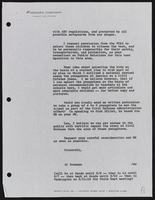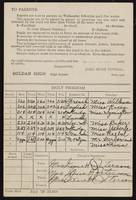Search the Special Collections and Archives Portal
Search Results
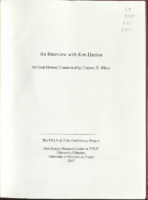
Transcript of interview with Ken Hanlon by Claytee D. White, November 29, 2006
Date
Archival Collection
Description
Text

Transcript of interview with Frankie Perez by Elsa Lopez and Laurents Bañuelos-Benitez, November 5, 2018
Date
Archival Collection
Description
Frankie Perez (1986- ) is an individual that constantly found himself navigating two worlds, whether it was military versus civilian; female versus male; or being Latinx in the United States. As a result of this navigation, Perez has a unique perspective on our ever more complicated world that not many individuals possess. Perez served in the military during the Do Not Ask, Do Not Tell policy which made it difficult for someone dealing with gender identity, to seek out the proper support they need. Despite the policy, and other policies that were put in place afterwards to inhibit the transgender community in the military, Perez began his transition while still serving his country. In direct contradiction of popular opinion, Perez discovered that the military easily accommodated his transition. Outside of the military Perez is an active voice in the LGBTQ community. As a member of the LGBTQ, Latinx, and military community, Perez has a unique perspective that he uses to fight for both LGBTQ and Latinx rights. Currently, Perez is finishing his degree in gender and sexuality studies at UNLV. He hopes to use his education to help people have the difficult discussions and improve conditions for his communities.
Text

Series of two Polaroid photographs of Marzette Lewis with her Charles I. West Middle School math class
Date
Archival Collection
Description
Series of two color Polaroid photographs of Marzette Lewis with her math students.
Image
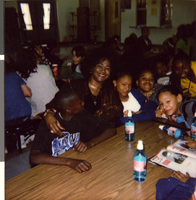
Series of two Polaroid photographs of Marzette Lewis with her Charles I. West Middle School students at lunch
Date
Archival Collection
Description
Series of two color Polaroid photographs of Marzette Lewis with her students in the cafeteria.
Image

Sandra Candel oral history interview: transcript
Date
Archival Collection
Description
Oral history interview with Sandra Candel conducted by Elsa Lopez, Monserrath Hernández, and Barbara Tabach on October 03, 2019 for the Latinx Voices of Southern Nevada Oral History Project. Sandra Candel talks of her childhood growing up with her grandparents in Guadalajara, Jalisco after her mother immigrated to America. She moved to California to attend university before moving to Salt Lake City, Utah, where she raised her children and began homeschooling them. This path led to Sandra opening a Montessori school, igniting her interest in education. She talks of her pursuit of both a Masters Degree from Drexel University and a Doctoral Degree from the University of Nevada, Las Vegas (UNLV). Sandra concludes her interview with discussion of her research and current employment as a part-time instructor for the Department of Interdisciplinary, Gender, and Ethnic Studies at UNLV. Subjects discussed include: Guadalajara; Salt Lake City, Utah; Sensitive Teaching Practices; Multi-generational families.
Text
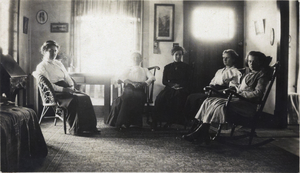
Photograph of Julia Russell, Mrs. Worrell, Grace Worrell, Olive Lake, and Wanda Bell, circa 1900s-1930s
Date
Archival Collection
Description
Image

Transcript of interview with Lois Esther Tarkanian by Claytee D. White, September 24, 2014
Date
Archival Collection
Description
Jerry Tarkanian, legendary and formidable basketball coach, met his match the day he was called before student court at Fresno State College and had to face as one of his judges Lois Esther Huter. Lois, a no-nonsense military daughter, eventually agreed to date Tarkanian and to marry him. The City of Las Vegas got lucky when UNLV recruited Lois’s husband as basketball coach. After picking cotton in California’s Central Valley Lois earned her Master’s degree in speech pathology and holds national certifications in speech pathology, language, and audiology. In 1969 she opened California’s first private day school for the hearing impaired, Oralingua School for the Hearing Impaired in Whittier. In Las Vegas she taught hearing-impaired children in her home on an individual and pro-bono basis. In this interview Lois recalls her teaching career, debates in deaf education, her 12 years on Clark County School District School Board, and the people and the neighborhoods that make up Las Vegas’s Ward 1, the area she has represented on the Las Vegas City Council continuously since 2005.
Text

